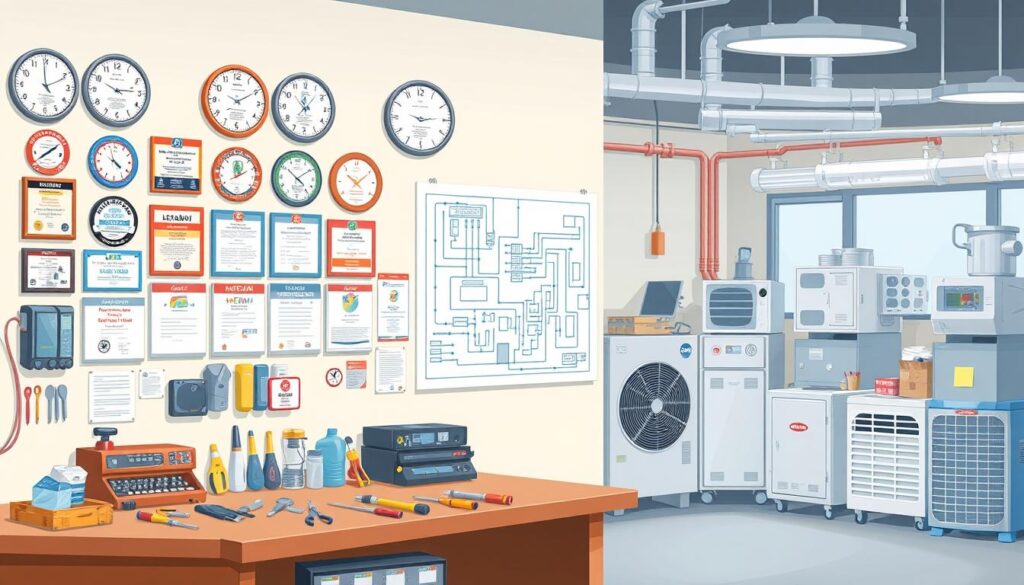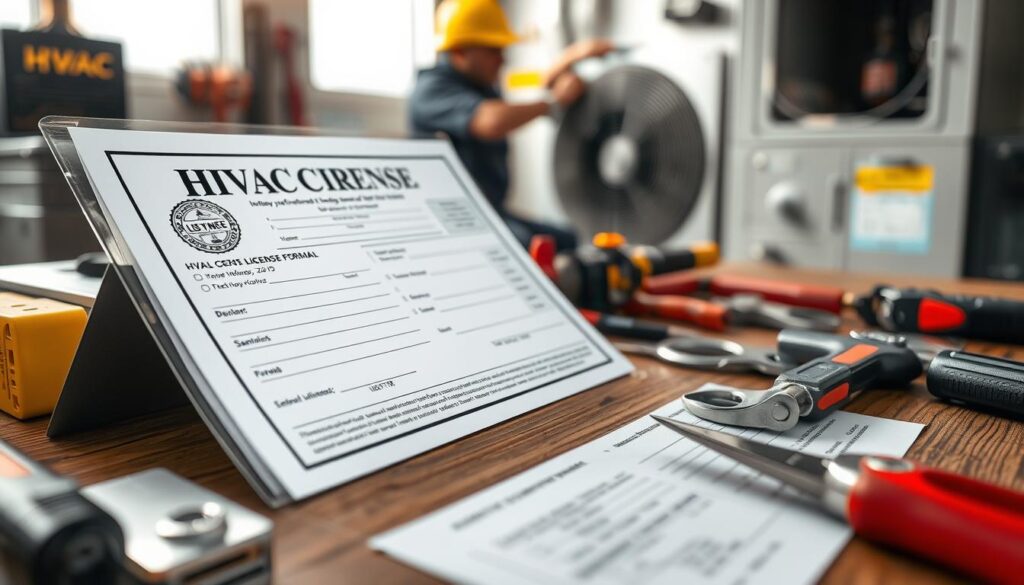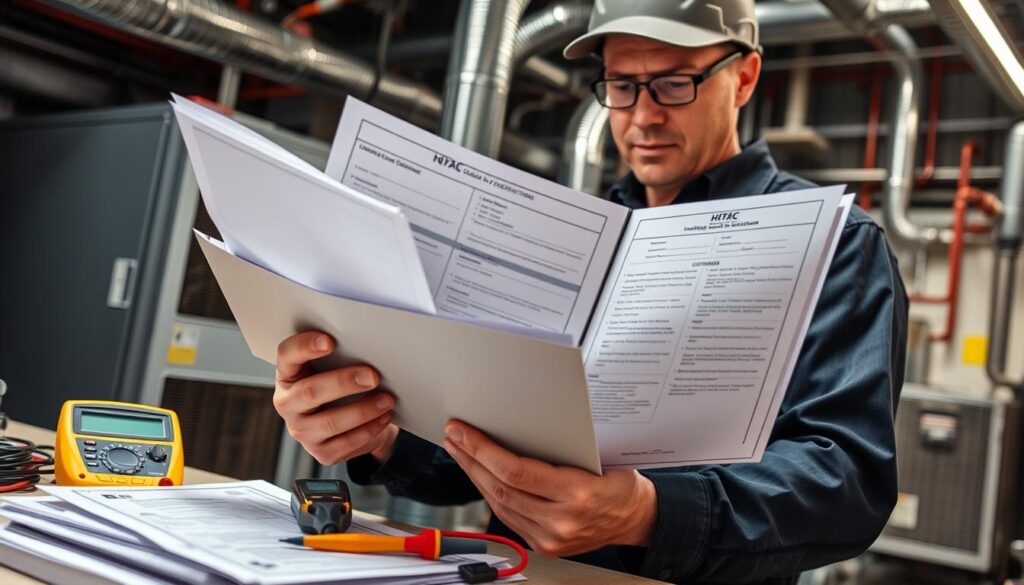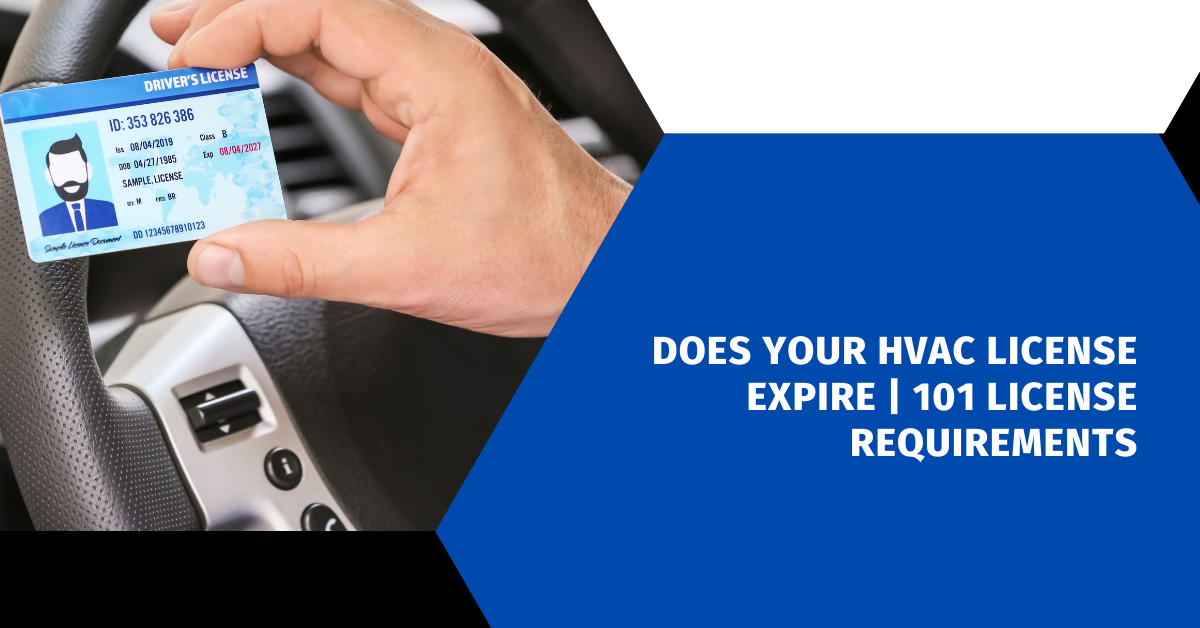Affiliate Disclosure
HVAC Guide Guys is a participant in the Amazon Services LLC Associates Program, an affiliate advertising program designed to provide a means for sites to earn advertising fees by advertising and linking to Amazon.
Does Your HVAC License Expire? Your HVAC license is key to your business. It shows you’re an expert, committed to quality, and trusted by clients. But what if your license is about to expire? The thought of losing your certification can worry even the most experienced HVAC contractors.
In this article, we’ll explore the world of HVAC licensing. We’ll look at the rules, details, and important deadlines. Every HVAC pro needs to know this to keep their license and protect their work.

Key Takeaways
- HVAC licensing rules differ by state, so knowing your area’s laws is crucial.
- To renew, you’ll need to apply, pay fees, and meet state conditions before your license expires.
- Not renewing on time can lead to an expired license. This limits your legal work and harms your reputation.
- Apply for renewal 30-60 days early to ensure enough time for approval.
- Many states require HVAC licensees to take continuing education courses, including state law updates.
Table of Contents
Understanding HVAC License Validity and Duration
It’s key to know about HVAC licenses and their validity periods. In the U.S., HVAC licenses vary by type, such as apprentice, journeyman, and contractor. Each has its own rules and how long it’s valid for.
Types of HVAC Licenses Available
- Apprentice HVAC License: Allows individuals to work under a licensed HVAC pro while learning.
- Journeyman HVAC License: Gives HVAC techs the freedom to work on their own on many HVAC systems.
- Contractor HVAC License: Lets HVAC contractors run their own businesses and manage projects.
License Duration Periods by Type
The length of HVAC licenses varies by state and type. For instance, in Michigan, licenses last three years and cost $75 to renew. Other states might have licenses that expire every year or two, needing more frequent renewals.
Initial Licensing Requirements
To get an HVAC license, you must meet certain requirements. These often include an apprenticeship, work experience, and passing exams. The exact needs vary by state and license level, so it’s crucial to check your local rules.
| HVAC License Type | Average Hourly Wage in Michigan | Average Annual Salary in Michigan |
|---|---|---|
| HVAC Installer | $25.10 | $52,208 |
| HVAC Technician | $27.00 | $56,160 |
| HVAC Mechanic | $31.00 | $64,480 |
| HVAC Supervisor | N/A | $83,185 |
In Michigan, getting an HVAC license costs $300 at the start of a three-year cycle. HVAC techs in the state make about $27.00 an hour, with a pay range of $17.82 to $42.82. Those with special licenses can make $20 to $30 an hour. HVAC supervisors in Michigan earn between $59,532 and $113,096.
State-Specific HVAC Licensing Regulations
The rules for hvac licensing requirements differ a lot from state to state. Some places, like Colorado, don’t need state licenses for HVAC work. But, other states have strict rules that contractors must follow.
In California, HVAC pros must pass two exams and have 4 years of experience in the last 10. Florida has four HVAC license types, each with its own rules for certified and registered contractors.
In Delaware, you need a master HVACR license for any HVAC work. Connecticut has 21 HVAC licenses, each with its own experience and skill needs.
It’s key for HVAC pros to know the hvac contractor license duration and rules in each state they work in. Not knowing these can cause penalties, legal problems, or even lawsuits.
In Alabama, HVAC contractors must have an apprenticeship certificate or 3,000 hours of work experience. Arizona requires 4 years of HVAC experience or 2 years plus an apprenticeship or course.
Understanding HVAC licensing can be tough. But, knowing and following state rules is vital for HVAC pros to work safely and legally.
Does Your HVAC License Expire: Important Timeline Considerations
As an HVAC pro, knowing your license’s expiration date is key. HVAC licenses expire at different times in various states. It’s vital to know the timeline in your area.
Common Expiration Periods
In many places, HVAC licenses need to be renewed every year. For instance, in California, your license is good for two years. You’ll need to pay a $450 renewal fee to keep it active. If you miss the renewal, you could face big problems.
Tracking Your License Status
It’s important to keep track of your hvac license expiration date. Use reminders, mark your calendar, or check online tools. This way, you won’t miss a renewal deadline.
Consequences of Expired Licenses
If your hvac license lapses, you could face fines and legal issues. You won’t be able to work legally, and your reputation might suffer. Some states require extra steps or fees to get your license back. It’s better to stay ahead and keep your license current.
“Maintaining an active HVAC license is not only a legal requirement but also a crucial aspect of professionalism in the industry. Staying on top of your hvac technician license expiration date can help you avoid costly setbacks and protect your career.”
Essential Requirements for HVAC License Renewal
Keeping your HVAC license up to date is key to working legally in the field. To renew your hvac license, you must complete a few important steps. These include taking continuing education courses, paying fees, and showing you’ve been working in the field.
In many places, HVAC pros need to finish a certain number of continuing education hours to renew their licenses. For example, in Oklahoma, mechanical licensees must do 6 hours of continuing education every 3 years to renew.
- Fulfill continuing education requirements as mandated by your state or local authorities.
- Pay the applicable renewal fees to the governing licensing board or agency.
- Provide proof of ongoing work experience in the HVAC field.
- Stay current with industry standards and any updates to HVAC codes or regulations.
Some states might also ask you to pass new exams or show you know the latest in the field for hvac license renewal. It’s important to know what your state needs to make sure you renew on time.
“Renewing your HVAC license is essential for maintaining your professional credentials and staying compliant with industry regulations.”
By doing what’s needed, you can keep your HVAC license active. This lets you keep giving top-notch service to your clients. Make sure to watch your renewal deadline and get ready to meet the requirements.
Maintaining Professional HVAC Credentials
Being an HVAC pro means keeping your skills sharp. This means learning new things, getting better at your job, and getting the right certifications. By doing this, you make sure you’re always up-to-date and your license stays good.
Continuing Education Requirements
Many places need HVAC techs to take extra classes to keep their licenses. These classes teach about new tech, saving energy, staying safe, and following new rules. It’s key to keep your license and show you’re serious about your work.
Professional Development Hours
There’s more to learning than just what’s required. HVAC pros also look for extra chances to grow. This can be going to conferences, taking workshops, or getting renewing hvac credentials online. It’s a way to show you’re really into your job.
Industry Certifications
Getting certifications like those from NATE can really help. They show you’re good at specific HVAC jobs. They’re great for finding new jobs or moving up in your career.
Keeping your HVAC credentials up is a big job. It takes hard work and staying informed. By learning new things, getting extra training, and getting certifications, you keep your skills fresh. This helps you succeed in the HVAC world for a long time.
Cost Factors in HVAC License Renewal
Renewing your HVAC license can cost a lot, depending on where you are and the rules you need to follow. Knowing these costs is key to keeping your business running smoothly and legally.
The main cost is the renewal fee. This can be anywhere from $0 to $650, with most being between $75 and $140. But, the exact price can change based on your state and local rules.
You might also have to pay for continuing education and industry certifications. Many places require HVAC pros to take certain classes or pass exams to keep their licenses. These costs can be from a few hundred to over a thousand dollars, depending on what’s needed.
Business owners should also think about insurance, bonds, and other licenses needed for HVAC license renewal. Liability insurance for HVAC contractors usually costs between $300 and $10,000 a year, with an average of $700.
| Cost Type | Average Range |
|---|---|
| Renewal Fee | $75 – $140 |
| Continuing Education | $200 – $1,000+ |
| Liability Insurance | $300 – $10,000 annually |
By knowing these costs, HVAC pros can plan for the money needed to keep their licenses. This helps ensure their businesses stay legal and running well.

EPA Certification Requirements and Validity
Being an HVAC technician means you need a valid EPA certification. This is key for your career and keeping the industry safe. The EPA’s Section 608 certification is a lifelong badge. It needs renewal every five years to keep up with new rules and best practices.
Section 608 Certification Details
The EPA has four levels of Section 608 certification: Type I, Type II, Type III, and Universal (Type IV). Each level has its own set of skills and knowledge for working with different refrigerants and HVAC parts. All HVAC techs must have EPA certification to legally work with refrigerants.
Renewal Procedures and Timeframes
- EPA Section 608 certifications don’t expire, but you must renew every five years.
- To renew, you’ll need to pass a big exam. It checks your knowledge of current laws, how to handle refrigerants, and safety.
- You can renew your EPA certification through approved training or by taking the EPA exam again.
Keeping your hvac certification expiration valid is crucial for HVAC pros. It shows you’re serious about maintaining hvac license and following federal rules. By keeping up with EPA Section 608, HVAC techs help the environment, protect their jobs, and offer top-notch service to clients.
“EPA certification is a legal must for all HVAC techs working with refrigerants. Doing HVAC work without the right certification can lead to big fines and penalties.”
Insurance and Bonding Requirements for License Renewal
As an hvac contractor, it’s key to keep your insurance and bonding up to date. Many states, like North Carolina, have rules for hvac licensing requirements when renewing your license.
In North Carolina, HVAC pros need to show proof of several insurance types. These include:
- General liability insurance for accidents and injuries
- Workers’ compensation insurance for businesses with three or more employees
- Commercial auto insurance for vehicle-related incidents
- Commercial property insurance for damage or vandalism
Also, HVAC contractors must get a surety bond to renew their license. The bond amount changes by location. For example, Greensboro needs a $2,000 bond, while Winston-Salem requires a $2,500 bond.
To renew your HVAC license in North Carolina, you’ll need to pay a fee. Refrigeration contractors pay $80, and heating and cooling contractors pay $150. You must also pass a licensing exam with a score of at least 70% on each part.
| Requirement | Details |
|---|---|
| Surety Bond | $2,000 in Greensboro, $2,500 in Winston-Salem |
| Renewal Fees | $80 for refrigeration contractors, $150 for heating and cooling contractors |
| Licensing Exam | Minimum score of 70% on each part |
| Work Experience | Minimum of 4,000 hours of relevant experience |
By knowing and following these hvac contractor license duration and insurance rules, HVAC contractors in North Carolina can renew their licenses easily. This keeps their professional credentials in good standing.

Common Causes of License Expiration and How to Avoid Them
Keeping your HVAC license valid is key for professionals in the field. Even the most careful among us can see our hvac license expire. Knowing why licenses expire and how to keep yours active can prevent problems.
One main reason for hvac license expiration is not completing required continuing education hours. HVAC techs and contractors must take courses and earn credits to renew their licenses. Not doing this can cause your license to expire.
Another reason is missing the renewal deadline. HVAC pros must keep track of their license’s expiration date and renew on time. Some states offer grace periods, but it’s up to you to renew on time.
Changes in state rules can also cause a lapse. It’s important to stay informed about new requirements, like certifications or test changes, to keep your license valid.
- Set calendar reminders for license renewal deadlines
- Complete continuing education requirements well before the expiration date
- Stay up-to-date on any changes in state HVAC licensing regulations
- Use automated notifications or enlist the help of a professional to ensure timely renewal
- Act quickly to rectify an expired license by contacting the relevant state board
By being proactive and alert, HVAC pros can avoid the hassle and cost of an expired hvac license. Keeping your license valid not only keeps you in good standing but also ensures your work is safe and of high quality.
Conclusion
Being an HVAC pro means you need a valid license. It’s key for your job and follows state and local rules. The rules for does your hvac license expire, hvac licensing requirements, and maintaining hvac license change a lot.
It’s important to check your license often. You also need to keep up with continuing education and renew on time. If you don’t, you could face fines, legal trouble, and can’t work legally.
Knowing and following hvac licensing requirements helps keep your skills sharp. It also makes you more reliable to clients. Plus, getting industry certifications boosts your skills and makes you stand out in the HVAC world.
By following these steps, you keep your license active. This also helps you grow professionally and succeed in the HVAC field.

